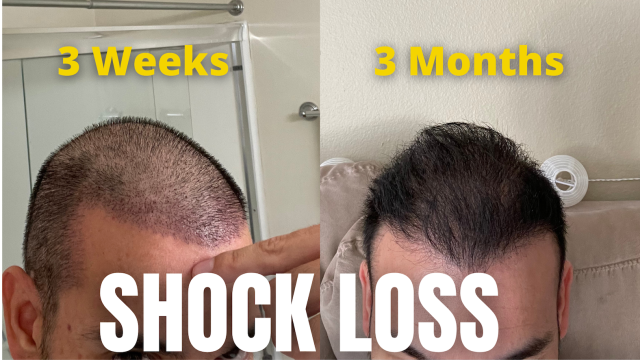Getting a hair transplant is a rollercoaster of emotions. It has ups, downs, and everything in between. There's a reason why they call it a hair transplant journey. By the end, you feel like your surgery was decades ago, but in reality, it's only been 12 months. There's a lot of information online, some good, some bad, some nothing more than shameless marketing. In this article, I'm going to try and equip you with enough information to make an informed decision on whether you want to undergo a hair transplant and hopefully some peace of mind if you have already had one.
Hair Transplant Stages
Immediately after surgery, you should expect your head to look red and full of scabs. You may have some residual swelling that could drop down to your face, don't be surprised if you look like Sloth from the Goonies. Everything you hear about returning to everyday life a few days after surgery is utter nonsense. You need at least two weeks off unless you work from home and don't have to see clients or co-workers.
After you remove the scabs around the 14-day mark, you enter what I like to call the 'honeymoon' phase; this is when your hair looks the best. You will look like you just received a fresh buzz cut. Unfortunately, the honeymoon phase doesn't last for long. By the 30-day mark, your grafts should be shedding, and by the second month, you will enter the DREADED ugly duckling phase.
Ugly Duckling Phase
The ugly duckling phase is the hardest part of having a hair transplant. Your hair looks like that neighbor's lawn that hasn't been watered for years. It's a dirt patch with a few stragglers hanging for dear life. So why do you go through this terrible period? Well, it's a combination of things. For one, you may experience shock loss, otherwise known as telogen effluvium. Shock loss occurs because the trauma of the surgery causes your native hair to go into the dormant phase, along with your transplanted hair, so you are left with a couple of hairs on your head. Luckily, this terrible period usually doesn't last long, a month to two months, but if you are one of those unlucky individuals, it could take up to four months.
The Terrible Three's
So you have reached the third month, pat yourself on the back. You are over the worst part, or are you? The third month can feel like an eternity. Not much has happened by this time. Your hair has started to grow back. You're slowly starting to resemble your former self. But that tremendous growth that everyone keeps talking about, you haven't experienced any of that. You still look a little worse than you did before your surgery. What gives? Don't start freaking out just yet; though it may feel like an eternity, the truth is, you've only just started your journey. I like to call this period the terrible three's because it feels like a long time, but it isn't, which can drive you nuts.
The waiting game sucks, you can hear 'be patient' a million times, and you may have even been the person saying that to someone else, but you have no idea until you go through it yourself. It can be a difficult time as a patient, there's only one way to find solace, and that is by speaking to other patients who have gone through the same thing. Looking at verifiable data and experiences could help ease anxiety. Where do you find this information? The most popular hair transplant forum in the English-speaking world is the Hair Restoration Network. Thousands of hair transplant reviews and experiences.
Growing Phase
So you made it out of the ugly duckling and the terrible threes. You are almost there, but not quite. You should expect around 50% of your growth by six months. You might see some other patients look incredible by six months, and others not so good. If you find yourself in the not-so-good category, don't fret, there is still plenty of time. Remember, it's a marathon, not a race. You may be what's referred to as a 'slow-grower,' meaning it takes you a little longer for your hair to grow in. It can take up to 18 months for your results to fully mature and grow. As hairs start to grow, they are usually tiny and colorless. As the months progress, they get thicker and fuller.
Maturation
So your hair transplant is done growing, and you have reached the twelve-month mark. If you're not happy now, it's time to speak to your surgeon. Your hair may mature and thicken in the next six months, but the difference is marginal overall. If you're 95% satisfied by twelve months, you may be 100% satisfied by eighteen months. If you're not satisfied at all, you are likely not going to be satisfied. To understand the hair transplant process a little better, register on the Hair Restoration Network, the number one hair transplant forum used by thousands of patients to learn everything you need to know. If you want to get a hair transplant, but have no idea where to start or which surgeons to look at feel free to submit some virtual consultations with our recommended hair transplant surgeons who have been approved based on excellent reviews and patient experiences. Remember lists are starting points for research, make sure you do your due diligence and research each surgeon on our forum.

